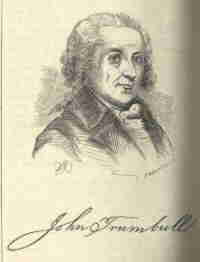 SKC Films Library SKC Films Library |
|
|
| SKC Films Library >> Linguistics, Languages, and Literatures >> American Literature >> Colonial Period |
 John Trumbull John Trumbullpoet John Trumbull was born in what is now Watertown, Connecticut, on April 24, 1750. He passed the Yale entrance examinations at the age of seven, but did not enter the college until 1763; he graduated in 1767, but remained at the college studying, and was a tutor there from 1771 to 1773. Between 1769 and 1770, while studying at Yale, Trumbull contributed ten essays called "The Meddler" to the Boston Chronicle, and in 1770 another series of essays, signed "The Correspondent," to the Connecticut Journal and New Haven Post Boy. While a tutor he wrote his first satire in verse, The Progress of Dulness (1772-1773), an attack in three poems on educational methods of his time. In 1773, Trumbull moved to Boston to study law under John Adams, and began practicing law in Connecticut after 1774. Trumbull began work on what would prove to be his most significant poem in 1775. M'Fingal, published in 1782, was a satiric attack on British military leaders during the Revolutionary War. The poem was a popular success and was reprinted more than 30 times between 1782 and 1840. After the war, Trumbull, a rigid Federalist, teamed with David Humphreys, Joel Barlow and Lemuel Hopkins in writing the Anarchiad, a poem directed against the enemies of a firm central government. After M'Fingal and Anarchiad were published, Trumbull abandoned poetry for politics, serving as Connecticut State Attorney (1789), in the Connecticut State Assembly (1792 and 1800), as Justice of the Connecticut Superior Court (1801-1819), and as Judge of the Connecticut Supreme Court of Errors (1808-1819). He died in Detroit, Michigan, on May 11, 1831. Note: John Trumbull was a cousin of painter John Trumbull. SEE ALSO |
| SKC Films Library >> Linguistics,
Languages, and Literatures
>> American
Literature >> Colonial Period This page was last updated on 04/25/2017. |